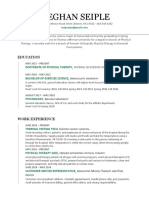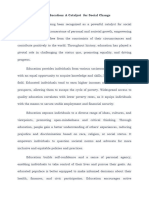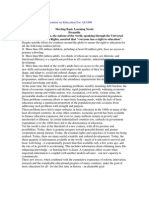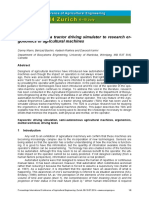Education
Education
Uploaded by
amanmaqsood8698Copyright:
Available Formats
Education
Education
Uploaded by
amanmaqsood8698Copyright
Available Formats
Share this document
Did you find this document useful?
Is this content inappropriate?
Copyright:
Available Formats
Education
Education
Uploaded by
amanmaqsood8698Copyright:
Available Formats
The Benefits of Education: Empowering Individuals and Societies
Education is widely recognized as a fundamental human right and a powerful tool for
personal development, social mobility, economic growth, and societal progress. This note
explores the multifaceted benefits of education, ranging from individual empowerment to
broader economic and social impacts.
Individual Benefits of Education
1. Knowledge and Skills Development:
o Education equips individuals with essential knowledge, skills, and
competencies necessary for personal and professional growth.
o It fosters critical thinking, problem-solving abilities, and creativity, enabling
individuals to adapt to new challenges and opportunities.
2. Career Opportunities:
o Education enhances employability by providing specialized knowledge and
qualifications sought by employers.
o Higher levels of education often correlate with higher earning potential and
career advancement opportunities.
3. Personal Growth and Empowerment:
o Education promotes self-confidence, self-awareness, and a sense of autonomy,
empowering individuals to make informed decisions about their lives.
o It cultivates a lifelong love for learning and intellectual curiosity, contributing
to personal fulfillment and well-being.
4. Health and Well-being:
o Educated individuals are more likely to adopt healthier lifestyles, make
informed health-related decisions, and access healthcare services.
o Education correlates with lower rates of mortality, improved mental health
outcomes, and higher life satisfaction.
Economic Benefits of Education
1. Economic Growth and Development:
o Education drives economic productivity and innovation by fostering a skilled
workforce capable of contributing to technological advancements and industry
growth.
o Nations with higher levels of education typically experience higher economic
growth rates and competitiveness in the global market.
2. Reduction of Poverty and Inequality:
o Education is a powerful tool for poverty alleviation, enabling individuals to
escape the cycle of poverty through improved job prospects and higher
incomes.
o It reduces income inequality by providing opportunities for social mobility and
leveling the playing field for disadvantaged groups.
3. Entrepreneurship and Innovation:
o Education fosters entrepreneurial skills and creativity, empowering individuals
to start businesses, create jobs, and drive economic innovation.
o It encourages research and development, leading to breakthroughs in science,
technology, and sustainable development.
Social and Cultural Benefits of Education
1. Social Cohesion and Civic Engagement:
o Education promotes social integration, tolerance, and understanding among
diverse communities by fostering empathy and respect for cultural diversity.
o Educated individuals are more likely to participate in civic activities, vote in
elections, and contribute to community development initiatives.
2. Gender Equality and Empowerment:
o Education is instrumental in advancing gender equality by empowering
women and girls with knowledge, skills, and opportunities for leadership and
decision-making roles.
o It reduces gender disparities in education access, employment, and social
status, promoting a more equitable society.
3. Cultural Preservation and Heritage:
o Education plays a crucial role in preserving cultural heritage, traditions, and
languages by transmitting knowledge from one generation to the next.
o It fosters appreciation for cultural diversity and promotes cultural exchange,
enriching societal cohesion and global understanding.
Long-term Benefits of Education
1. Sustainable Development:
o Education is essential for achieving sustainable development goals (SDGs)
related to poverty eradication, health and well-being, quality education, gender
equality, and environmental sustainability.
o It prepares future generations to address global challenges such as climate
change, resource depletion, and social inequality through informed decision-
making and responsible citizenship.
2. Global Competitiveness and Diplomacy:
o Nations with well-educated populations are more likely to succeed in the
global economy, attract foreign investment, and participate effectively in
international diplomacy and cooperation.
o Education enhances a country's soft power by promoting positive perceptions
abroad and fostering international collaborations in research, innovation, and
cultural exchange.
Conclusion
Education is a cornerstone of personal development, economic prosperity, social cohesion,
and sustainable development. Investing in education yields broad-ranging benefits, from
empowering individuals to transforming societies and driving global progress. By prioritizing
inclusive and equitable access to quality education for all, governments, communities, and
stakeholders can unlock the full potential of education as a catalyst for positive change and
human flourishing.
In summary, education is not only a pathway to individual success but also a catalyst for
building resilient, prosperous, and inclusive societies that thrive on knowledge, innovation,
and shared values.
You might also like
- Mozart's Requiem Historical and Analytical Studies, Documents, Score by Christoph WolffDocument276 pagesMozart's Requiem Historical and Analytical Studies, Documents, Score by Christoph WolffMirko Zambelli100% (3)
- Glacial Map of OhioDocument2 pagesGlacial Map of OhioSalvadora10% (1)
- Web App Lab Manual R20 by HemanthDocument41 pagesWeb App Lab Manual R20 by HemanthGopi Naveen80% (5)
- WP Integrating Active Directory MLDocument14 pagesWP Integrating Active Directory MLFarid BouNo ratings yet
- Meghan Seiple: EducationDocument2 pagesMeghan Seiple: Educationapi-545026502No ratings yet
- Importace of EducationDocument2 pagesImportace of EducationAyeda RaiNo ratings yet
- Hpe Assignment 2Document8 pagesHpe Assignment 2mwansashadrick100No ratings yet
- Untitled documentDocument5 pagesUntitled documenthaiqasharif29No ratings yet
- Importance of EducationDocument3 pagesImportance of EducationStock market DiscoverNo ratings yet
- SDM Seminar PPT Edited123Document15 pagesSDM Seminar PPT Edited123rajahuliharsh8055No ratings yet
- The Importance of Education EmpoweringDocument2 pagesThe Importance of Education Empoweringbboit031No ratings yet
- Education ArticleDocument5 pagesEducation Articleadnanghafoor5926No ratings yet
- SDM Seminar PPT 1 FinalDocument14 pagesSDM Seminar PPT 1 Finalrajahuliharsh8055No ratings yet
- Campaign of Education For AllDocument7 pagesCampaign of Education For AllSumon DebnathNo ratings yet
- Value of EducatioDocument12 pagesValue of Educatioq3ok8rs3No ratings yet
- The Role of Education in Social and Economic DevelopmentDocument4 pagesThe Role of Education in Social and Economic DevelopmentJames BolchoverNo ratings yet
- Essay On The Importance of EducationDocument1 pageEssay On The Importance of EducationZABLON MUTHOKANo ratings yet
- EducationDocument17 pagesEducationAnviNo ratings yet
- The Importance of Education For Personal and Societal DevelopmentDocument2 pagesThe Importance of Education For Personal and Societal Developmentprayototio99No ratings yet
- The Significance of Education in Shaping The FutureDocument2 pagesThe Significance of Education in Shaping The Futureerebong4193No ratings yet
- The Importance of EducationDocument2 pagesThe Importance of EducationneliuswanjirukileiNo ratings yet
- EducationDocument12 pagesEducationnaveedbro666No ratings yet
- Education Is A Fundamental Aspect of Human Life That Plays A Critical Role in Shaping Individuals and SocietiesDocument2 pagesEducation Is A Fundamental Aspect of Human Life That Plays A Critical Role in Shaping Individuals and Societiesrahul kumarNo ratings yet
- 1. Importance of EducationDocument1 page1. Importance of Educationnabu054uNo ratings yet
- Education As Catalyst For Social ChangeDocument2 pagesEducation As Catalyst For Social ChangeLovely May CarinoNo ratings yet
- The Role of Education in Shaping Future GenerationsDocument7 pagesThe Role of Education in Shaping Future GenerationsumaiqureshiNo ratings yet
- Research Paper The Impact of Social Media on Society_20241211_182659_0000Document17 pagesResearch Paper The Impact of Social Media on Society_20241211_182659_0000kingyanjiebugna156No ratings yet
- EducationDocument2 pagesEducationClarizel MolinaNo ratings yet
- Essay - Importance of EducationDocument2 pagesEssay - Importance of EducationabuzarkaramatNo ratings yet
- Importance of TelevisionDocument4 pagesImportance of TelevisionkushiloveenahurchurnNo ratings yet
- Preservation of Education in A CommunityDocument12 pagesPreservation of Education in A CommunityFatima RizwanNo ratings yet
- TEchnoDocument2 pagesTEchnotemuulen.sh528No ratings yet
- Role of EducationDocument2 pagesRole of EducationVampire ShortsNo ratings yet
- Unesco World Declaration On Education For All Jomtien ThailandDocument6 pagesUnesco World Declaration On Education For All Jomtien ThailandVũ AnhNo ratings yet
- EDE4940 Course NotesDocument3 pagesEDE4940 Course NotesJohannes WeinerNo ratings yet
- The Importance of Education in Modern SocietyDocument2 pagesThe Importance of Education in Modern SocietyMalubag Kristine Joy B.No ratings yet
- Edu 1000Document5 pagesEdu 1000terrencemulimba3350No ratings yet
- Chapter 2 Profed 02Document9 pagesChapter 2 Profed 02Maximus YvosNo ratings yet
- Power of Education Empowering IndividualsDocument2 pagesPower of Education Empowering IndividualsNinggen HoomanNo ratings yet
- Importance of Education EssayDocument1 pageImportance of Education Essayt8mkg6smwjNo ratings yet
- Question - 5Document2 pagesQuestion - 5Habib APSNo ratings yet
- Essay 3Document1 pageEssay 3luky yoga sasongkoNo ratings yet
- Recovery and EducationDocument2 pagesRecovery and Educationar saNo ratings yet
- stu4Document2 pagesstu4Areeha ZahidNo ratings yet
- Education Is The Cornerstone of Human Development and ProgressDocument2 pagesEducation Is The Cornerstone of Human Development and ProgressJan Pearl Hinampas100% (1)
- Document 2Document2 pagesDocument 2nickzapanta45No ratings yet
- Wa0014.Document2 pagesWa0014.anilkumarchaudhary907No ratings yet
- Gruop 1 UcspDocument18 pagesGruop 1 UcspnorwiejohnajijulkampangNo ratings yet
- UNESCO - World - Declaration - On - Education - For - All 1990Document22 pagesUNESCO - World - Declaration - On - Education - For - All 1990Francis A. BuenaventuraNo ratings yet
- VMGODocument28 pagesVMGOcutieemayenggNo ratings yet
- Importance of EducationDocument2 pagesImportance of EducationRifa FitrianiNo ratings yet
- Why Is Education Important To StudentsDocument5 pagesWhy Is Education Important To StudentsjenifargeroltNo ratings yet
- The Role of Education in Empowering Individuals and Promoting Societal ProgressDocument2 pagesThe Role of Education in Empowering Individuals and Promoting Societal Progress6A DS //No ratings yet
- Unit 5 - Social Well-BeingDocument9 pagesUnit 5 - Social Well-BeingRajashwi SaxenaNo ratings yet
- EssayDocument2 pagesEssayAshianna NietesNo ratings yet
- DVA 1502 Assignment 1Document7 pagesDVA 1502 Assignment 1John SteveNo ratings yet
- mwdjdnwindinwjkDocument2 pagesmwdjdnwindinwjkkolbe1walshNo ratings yet
- Dynamics of Social Change Assignment - 513Document2 pagesDynamics of Social Change Assignment - 513HEMANTHDAMONo ratings yet
- English Project Jay 2Document23 pagesEnglish Project Jay 2ashish.patel1979No ratings yet
- SG Vision Statement On Transforming EducationDocument8 pagesSG Vision Statement On Transforming Educationkeyem71416No ratings yet
- The Benefits of SchoolDocument2 pagesThe Benefits of Schoolkashaf shahzadNo ratings yet
- The Importance of Education for the FutureDocument1 pageThe Importance of Education for the Futureadi.febriansyah.ssiNo ratings yet
- Education Is A Cornerstone of Personal and Societal DevelopmentDocument2 pagesEducation Is A Cornerstone of Personal and Societal DevelopmentEmmaNo ratings yet
- 4Document2 pages4baochau19502No ratings yet
- Exploring The Essence of JoyDocument3 pagesExploring The Essence of Joyamanmaqsood8698No ratings yet
- Understanding The Phenomenon of CryingDocument3 pagesUnderstanding The Phenomenon of Cryingamanmaqsood8698No ratings yet
- Islam Norms Encompass A Broad Range of Guidelines and Principles Derived From Islamic TeachingsDocument2 pagesIslam Norms Encompass A Broad Range of Guidelines and Principles Derived From Islamic Teachingsamanmaqsood8698No ratings yet
- Computer ScienceDocument2 pagesComputer Scienceamanmaqsood8698No ratings yet
- The History of EducationDocument2 pagesThe History of Educationamanmaqsood8698No ratings yet
- The Islamic Pagan RootDocument14 pagesThe Islamic Pagan RootkishorebooksscribdNo ratings yet
- Red Hat Enterprise Linux 7 - High Availability Add-On AdministrationDocument28 pagesRed Hat Enterprise Linux 7 - High Availability Add-On AdministrationsarasasasaNo ratings yet
- Mcts Questions and AnswersDocument8 pagesMcts Questions and AnswersKaveesha AnginthayaNo ratings yet
- Chap-12 Part 3Document28 pagesChap-12 Part 3Hanna Fritch LariosaNo ratings yet
- Revenue IntegrityDocument30 pagesRevenue Integritypallavi@igt100% (2)
- WomeninministryDocument34 pagesWomeninministryzaneleNo ratings yet
- Research Problem, Conceptual and Theoretical FrameworkDocument22 pagesResearch Problem, Conceptual and Theoretical FrameworkAbdishakur Dahir MuseNo ratings yet
- Lgricos Gla531 SeriesDocument71 pagesLgricos Gla531 SeriesHouceine BouyaNo ratings yet
- 0817682554Document211 pages0817682554sweet_88No ratings yet
- Astm E340-2023Document11 pagesAstm E340-2023Saravana VelNo ratings yet
- Paref Springdale School: Info - Office@parefspringdale - Edu.phDocument7 pagesParef Springdale School: Info - Office@parefspringdale - Edu.phFerminNo ratings yet
- RS Handbook Fall Final 2022upDocument27 pagesRS Handbook Fall Final 2022upIbrahim AlifNo ratings yet
- Internet Protocol Television (Iptv)Document17 pagesInternet Protocol Television (Iptv)openid_QrS6xpoINo ratings yet
- Structural Concrete Based On Alkali Activated Binders: Terminology, Reaction Mechanisms, Mix Designs and PerformanceDocument13 pagesStructural Concrete Based On Alkali Activated Binders: Terminology, Reaction Mechanisms, Mix Designs and PerformanceNuno FerreiraNo ratings yet
- Self Healing Technology For Asphalt PavementsDocument23 pagesSelf Healing Technology For Asphalt PavementsAhmedMahirNo ratings yet
- Link Belt X4 Long Front FamilyDocument12 pagesLink Belt X4 Long Front FamilyYew LimNo ratings yet
- Experiment No - 1 Flow Through A Sluice GateDocument11 pagesExperiment No - 1 Flow Through A Sluice Gatesalman40% (5)
- Receptionist Resume ExamplesDocument6 pagesReceptionist Resume Exampleszajgrwwhf100% (1)
- Agricultural Marketing, Trade and Prices: AECO-341, 3 (2+1)Document5 pagesAgricultural Marketing, Trade and Prices: AECO-341, 3 (2+1)Shivaji DarlingNo ratings yet
- Preface: SevenDocument60 pagesPreface: Seven24.Mr.Theutthavy Pms 7/6No ratings yet
- A Confident HeartDocument4 pagesA Confident HeartJhon Ray OtañesNo ratings yet
- Similes, Metaphors and PersonificationDocument7 pagesSimiles, Metaphors and Personificationavikrajbhowmik15No ratings yet
- Plato Charmides. Translated With Introdu PDFDocument8 pagesPlato Charmides. Translated With Introdu PDFdonwea25No ratings yet
- Development of A Tractor Driving SimulatorDocument8 pagesDevelopment of A Tractor Driving SimulatorAlexandra YubiNo ratings yet
- ISO_16750-5;2003Document12 pagesISO_16750-5;2003slavutinNo ratings yet






























































































